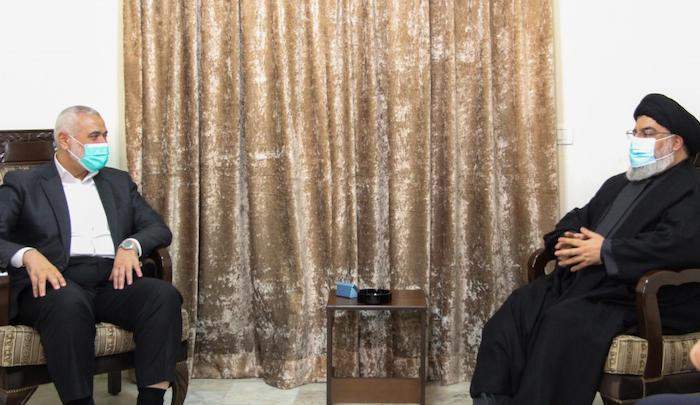Hamas and Hizballah leaders meet, call for ‘brotherhood and jihad,’ ‘regional alliance’ against US and ‘Zionists’

Source and Photo: https://www.jihadwatch.org/2020/09/hamas-and-hizballah-leaders-meet-call-for-brotherhood-and-jihad-regional-alliance-against-us-and-zionists
As expected as this call is, what makes it particularly concerning is that Hizballah and Hamas are far from isolated. “Qatar, Turkey, and Hamas in Gaza are aligned with the Sunni Islamist and antisemitic Muslim Brotherhood.” Qatar’s ambassador to Germany, Mohamed Jaham al-Kuwari, recently asserted that “Qatar has become a central power in the Middle East.” The Qatari government has demonstrated “blanket support of revolutionary movements,” according to the Washington Institute.
Qatar has also been funding Muslim Brotherhood expansion in Europe, mainly through mosques and Islamic centers. Hamas is an offshoot of the Muslim Brotherhood. Turkey is another diehard supporter of the Palestinian cause, and of the Muslim Brotherhood and Qatar. Haniyeh’s trip to Lebanon to meet with Nasrallah followed “a visit to Turkey during which he met with Turkish President Recep Tayyip Erdogan, triggering Israeli denunciation of the [UAE-Israel] relationship.”
So while there is cause to celebrate the UAE-Israel alliance, there are numerous forces now calling for jihad retaliation. The fact that the full normalization of Israel-Saudi relations doesn’t appear to be coming any time soon is also a matter of concern. In fact, Saudi Foreign Minister Faisal bin Farhan al-Saud recently reiterated his commitment to the Palestinian-Israeli peace process on terms of Israel returning to the pre-1967 borders.
The new Hizballah/Hamas call for a “brotherhood and jihad” alliance is a sign of desperation, but it also has teeth.
“Hamas, Hezbollah Leaders Form ‘Jihad Brotherhood’ Against Israel, U.S.,” by Deborah Danan, Breitbart, September 7, 2020:
The leaders of the Hezbollah and Hamas terror groups met recently to discuss how to build a united front against Israel and counter normalization between the Jewish state and the Arab world.Hezbollah chief Hassan Nasrallah and Hamas’ politburo leader Ismail Haniyeh met in Lebanon, the Hezbollah-run Al-Manar TV channel reported.Both Hezbollah and Hamas, which are based in Lebanon and Gaza, respectively, have sworn Israel’s destruction and are backed by Iran.Nasrallah and Haniyeh emphasized their “stability” of the “axis of resistance” against Israel.They also called for the “Muslim ummah” to stand up to Israel, according Iran’s state-affiliated Fars News agency.The two slammed President Donald Trump’s peace plan and called for “brotherhood and Jihad” and for the formation of a “regional alliance” against the U.S. and “Zionists,” according to the report.The two also discussed “political and military developments in Palestine, Lebanon, and the region” as well as the “the dangers to the Palestinian cause,” such as the U.S.-brokered agreement to establish diplomatic ties between Israel and the United Arab Emirates.Hamas released a statement shortly after the meeting saying that normalization between Israel and Arab countries, “does not represent the people, neither their conscience, nor their history nor their heritage.”On Sunday, Haniyeh was carried on the shoulders of a man through a cheering crowd in a Palestinian refugee camp in Lebanon.He threatened to rain down rockets in Tel Aviv as bystanders cheered.“Our missiles had a range of several kilometers from the border with Gaza,” Haniyeh said. “Today the resistance in Gaza has missiles that can hit Tel Aviv and beyond Tel Aviv.”…











